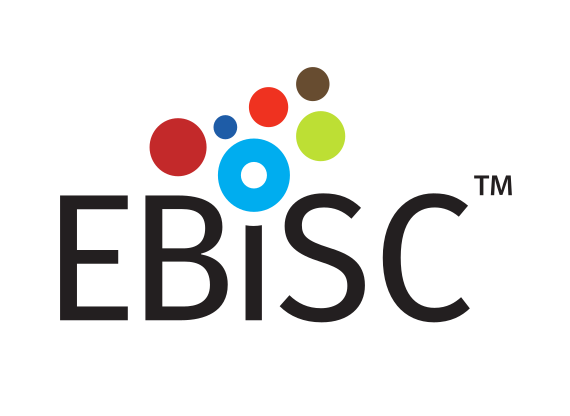EBiSC works with a broad network of non-profit and commercial organisations worldwide who collect donated tissue samples for iPSC line reprogramming, characterisation and/or deposition into EBiSC. Only with their crucial input and support for open research can EBiSC provide high quality, disease relevant iPSC lines.
Note: Not all depositors listed.
Late-onset Alzheimer’s disease (AD) has a high genetic contribution, estimated to be 60-80% of risk, and common forms of AD are highly polygenic. In the IPMAR Resource (iPSC Model for Alzheimer’s disease Research), we have captured the polygenicity of common AD in a large collection of iPSC lines reprogrammed from: (a) research-diagnosed late-onset AD with extremely high polygenic risk for AD, and (b) elderly cognitively healthy controls with extremely low polygenic risk for AD. Polygenic risk was quantified for individuals in the Cardiff AD cohort using a global AD polygenic risk score (Leonenko et al, 2021, doi: 10.1038/s41467-021-24082-z), which is effective for predicting individuals that will develop AD (Escott-Price et al, 2017, doi: 10.1002/ana.24999), and extremes of polygenic risk score were selected above or below 1.8 S.D. The iPSC lines have an associated dataset of anonymized clinical, cognitive and non-cognitive longitudinal data and genome-wide microarray data (Illumina 610 or global screening array), which is available upon application via the Dementia Platforms UK website (https://portal.dementiasplatform.uk). The Dementias Platform UK have also developed a data discovery tool that allows the iPSC lines to be filtered for parameters such as age of onset, sex, APOE ε-allele genotype, and polygenic risk score, which can be accessed here: https://portal.dementiasplatform.uk/projects/IPMAR.
The Barcelona Stem Cell Bank (B-SCB) is part of the Regenerative Medicine Program (RMP) (former CMR[B], Center of Regenerative Medicine in Barcelona), at the Institut d’Investigació Biomèdica de Bellvitge (IDIBELL) and one of the nodes of the Spanish Stem Cell Bank. Since 2008, the B- SCB has focused efforts in the field of hiPSC research and is nowadays a reference for the generation of patient-specific iPS cells for in vitro modelling of genetic disorders. The overall mission of the RMP is to conduct fundamental research of excellence for advancing the clinical translation of regenerative medicine strategies. The focus of the RMP core research activities is addressed at enabling iPSC-based regenerative therapies become a clinical reality using a goal- oriented approach, with specific disease/organ targets as focus. Based on prior scientific knowledge, outstanding bottlenecks to be solved, societal impact, and strategic opportunity, first- choice targets included are: i) heart failure; ii) neurodegenerative diseases; iii) non-malignant hematological diseases; and iv) age-related macular degeneration.
Research at the Hubrecht Institute is pioneering in developmental and stem cell biology. The institute encompasses 23 research groups that perform fundamental, multidisciplinary research on healthy and diseased cells, tissues and organisms, For the EBiSC collection, the Hubrecht Institute contributed several knock-out human iPSC-lines
Studying the developmental biology and disease of the eye is a core activity of the Retinal Stem Cell Research group (RSCR), led by Prof. Majlinda Lako in the Institute of Genetic Medicine at Newcastle University. Our mission is to exploit developmental, genetic and cellular information to better understand inherited and age related retinal disease and to work towards new treatments for patients with retinal disease. A few years ago, the only way we could obtain cells with these characteristics was, with appropriate patent consent, to extract embryonic stem cells from spare human embryos created for the purpose of in vitro fertilisation, but that were no longer needed. These days we don't need to do this since we can obtain cells with embryonic stem cell-like properties from many adult cell types via a process called reprogramming
We can perform this technique on adult cells which can be easily collected from patients; a few millilitres of blood or even a few hairs are all we need to make these reprogrammed cells, which are called "induced pluripotent stem cells" (iPSC for short). Just like their embryonic stem cell counterparts, these will grow indefinitely and can turn into any type of adult cell we want.
Naturally, this includes most of the cells of the retina, so iPSCs are a great resource for learning more about how the retina is assembled in the embryo - but also for understanding how retinal disease can occur. We can do this by making iPSCs from patients affected by retinal disease and examining the genetic and functional differences between retinal cells made from the patient's iPSCs and those made from iPSCs which were created from healthy donors.
Partner UKB is represented by the Institute of Reconstructive Neurobiology (IRN), which, under the leadeship of Prof. Oliver Brüstle, focuses on the study of mechanisms underlying neural differentiation of human pluripotent stem cells. Within the last years IRN scientists established a wide variety of differentiation methods, which enable the derivation of neural stem cells and multiple neuronal and glial cell types from human embryonic (hES cells) and induced pluripotent stem cells (hIPS cells). Research activities encompass fundamental principles of developmental neurobiology, cell reprogramming and neural lineage specification, stem cell-based modeling of neurodegenerative and psychiatric disease as well as neuregeneration. IRN closely interacts with the LIFE & BRAIN GmbH, a biomedical enterprise serving as translational hub of the University of Bonn Medical Center. In the early phase of EBiSC, partner UKB participated in the fast track "Hot Start" process whose goal was to become rapidly operational with a foundational collection of established hIPS cell lines. In addition, UKB made contributions regarding neural differentiation protocols as well as disease modelling, and was one of the centres in charge for the generation of newly commisssioned hIPS cell lines.
